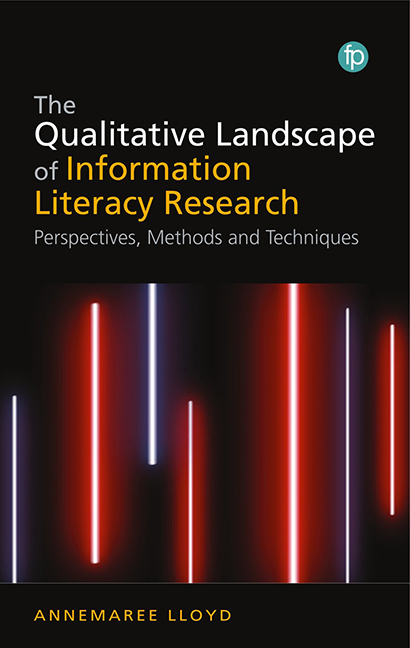Book contents
- Frontmatter
- Contents
- Figures
- Foreword
- Acknowledgements
- Introduction: The Qualitative Landscape of Information Literacy Research
- Chapter 1 Situating Information Literacy Research
- Chapter 2 Informing Information Literacy Research
- Chapter 3 Framing Information Literacy as an Educational Practice for Research. Learning Theories and Models
- Chapter 4 Qualitative Methods in Information Literacy Research
- Chapter 5 Collecting Data About Information Literacy: Data Collection Techniques
- Chapter 6 Planning for Research
- Chapter 7 Qualitatively Speaking and Doing Information Literacy Research
- References
- Index
Chapter 4 - Qualitative Methods in Information Literacy Research
Published online by Cambridge University Press: 21 October 2021
- Frontmatter
- Contents
- Figures
- Foreword
- Acknowledgements
- Introduction: The Qualitative Landscape of Information Literacy Research
- Chapter 1 Situating Information Literacy Research
- Chapter 2 Informing Information Literacy Research
- Chapter 3 Framing Information Literacy as an Educational Practice for Research. Learning Theories and Models
- Chapter 4 Qualitative Methods in Information Literacy Research
- Chapter 5 Collecting Data About Information Literacy: Data Collection Techniques
- Chapter 6 Planning for Research
- Chapter 7 Qualitatively Speaking and Doing Information Literacy Research
- References
- Index
Summary
Introduction
Bibliometric research that has been conducted over the last few years highlights a tendency to represent information literacy quantitatively, primarily through surveys of student learning and skills and competencies lists, checklists of evaluations against guidelines, etc. (Kolle, 2017; Pinto, Cordón and Gómez Díaz, 2010). While there is merit in this approach, quantifying information literacy does little to help us develop a deeper understanding of how the practice is experienced, constructed and shaped relative to the discourses and discursive practices of the context. Without the deep dive into the information experience that qualitative research provides, we are unable to draw the complex picture required to build the narrative. The complex and in-depth nature of the qualitative research process may result in smaller-scale studies, but this allows researchers to focus on understanding the layered fabric of the practice (how it is shaped and the conditions that enable or constrain emergence) or interrogating the practice to develop deeper understandings of the meanings that information literacy has for people, as it is practised in a specific setting or context.
The selection of methods used to qualitatively deep-dive into information literacy research should be considered in relation to the theoretical traditions that influence the world view of the researcher (the ontological view of research). Methods have not been developed in isolation from theoretical traditions and it is important for all researchers to be able to demonstrate in the descriptions and discussions of their research methodology a coherent theoretical framework to support the methodological decisions they make. Knowing how to ‘read’ methods to understand how the theoretical tradition shapes the method and influences its execution through research design and analysis is a central skill for all researchers. This is also a useful skill for academic librarians who may work with researchers or support academic faculty in the context of reviewing or recommending research-related literature. Consequently, when you are selecting a method for information literacy research, it is important to be aware of what it is you want to achieve through your research and to also consider the strengths and weaknesses or limitations of a particular approach or the selection of a specific data collection technique.
- Type
- Chapter
- Information
- The Qualitative Landscape of Information Literacy ResearchPerspectives, Methods and Techniques, pp. 55 - 78Publisher: FacetPrint publication year: 2021



